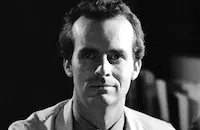The Paper Chase

Brief Synopsis
Cast & Crew
James Bridges
John Houseman
Timothy Bottoms
Lindsay Wagner
Graham Beckel
Jan Campbell
Film Details
Technical Specs
Synopsis
In his first year at Harvard, law student Hart tries desperately to deal with the pressure of his studies and impress his intimidating professor, Kingsfield. With a lot of hard work, Hart becomes successful in Kingsfield's class, but he is unnerved to learn that his new girlfriend is the professor's daughter.
Director
James Bridges
Cast
John Houseman

Timothy Bottoms
Lindsay Wagner
Graham Beckel
Jan Campbell
Craig Richard Nelson
Regina Baff

David Clennon
John Bethune
Nicholas Olah
Dora Dainton

Edward Herrmann
James Naughton
Bill Moher
Richard Whelan
Bob Lydiard
Blair Brown
Tony Silverthorne
David Johns
Lenny Baker
Alan Kwinter
Irma Hurley
Crew
J S Bach
J S Bach
James Bridges
Gerry Holmes
George Jenkins
Larry Jost
Tony Lucibello
Ray Mercer
Donald O Mitchell
Reg Morris
John Jay Osborn
John Jay Osborn
Phil Parslow
Phil Parslow
Rodrick Paul
Michael Preece
Christopher Seitz
G P Telemann
Robert C Thompson
Walter Thompson
John Williams
Gordon Willis
Hendrik G Wynands
Photo Collections
Videos
Movie Clip



Trailer
Film Details
Technical Specs
Award Wins
Best Supporting Actor
Award Nominations
Best Sound
Best Writing, Screenplay
Articles
The Paper Chase
Houseman had already made a name for himself as a screenwriter, a producer, and as a story editor. Citizen Kane (1941), Jane Eyre (1944), The Bad and the Beautiful (1952), and Executive Suite (1954) were just a few of his many film credits. Additionally, Houseman was a force on the legit stage, having produced the stage version of Richard Wright's Native Son and running a professional theater group at the University of Southern California, Los Angeles. It was while in the latter position that Houseman became involved in The Paper Chase, 14 years prior to the release of the film.
One day in the late 1950s, an actor-writer named James Bridges came to Houseman and asked for menial bits of jobs, the kind usually reserved for interns. In his zeal to learn about the theater, Bridges won Houseman over and the two became good friends. After graduating to writing and directing films, Bridges stayed in touch with his mentor. Once he started casting a new movie called The Paper Chase, Bridges sent the script to Houseman for recommendations on who he might cast in the crucial role of Professor Kingsfield, after the producers' first choice, James Mason, walked out. Houseman suggested Edward G. Robinson and others, but none were available. In a bind, Bridges then had an epiphany: why not Houseman? Once asked, Houseman said he'd be happy to play it, but that the studio wouldn't stand for a novice to play such an important part. Unfortunately, he was right. However, Bridges still didn't have his Kingsfield. Eventually, Houseman submitted to a screen test, and based on his performance, the studio realized they were a little too quick to judge against this "novice" actor.
Houseman did have some hesitations in taking on the role and the ensuing Oscar® buzz. He worried about memorizing long passages from the script, a problem that actually turned out to be no problem at all. He found playing the scenes agreeable, since the relationship between Kingsfield and the Timothy Bottoms character was similar to the one he shared with James Bridges. But once his name was among the nominees for the Best Supporting Actor Academy Award, Houseman was surprised. As he wrote in his autobiography, "my first reaction was one of incredulity and vague pleasure, followed by a sense of embarrassment at the realization that for most actors of my age an Academy Award or even a nomination comes as the hard-earned culmination of a long and dedicated career: mine was the reward for ten agreeable days spent with a friend in Toronto!" After his eventual Oscar® victory, Houseman still was not through with Professor Kingsfield. He played the curmudgeonly instructor on the The Paper Chase television series, which aired on various networks from 1978 to 1986.
Director/Screenwriter: James Bridges
Producer: Rodrick Paul, Robert C. Thompson
Cinematographer: Gordon Willis
Composer: John Williams
Editor: Walter Thompson
Art Director: George Jenkins
Associate Producer: Philip L. Parslow
Cast: Timothy Bottoms (Hart), Lindsay Wagner (Susan), John Houseman (Kingsfield), Graham Beckel (Ford), Edward Herrmann (Anderson), Blair Brown (Miss Farranti), James Naughton (Kevin), Lenny Baker (Moss), David Clennon (Toombs), Bill Moher (Philip).
C-112m. Letterboxed. Closed captioning.
by Scott McGee

The Paper Chase
Quotes
I know there's a lot of things to say, but it really isn't worth saying them, so please just get out.- Susan
You come in here with a head full of mush and you leave thinking like a lawyer.- Professor Kingsfield
You... are a SON OF A BITCH, Kingsfield.- Hart
Mr. Hart! That is the most intelligent thing you've said all day. You may take your seat.- Kingsfield
Speak louder, Mr. Hart! Fill the room with your intelligence!- Professor Kingsfield
Trivia
Miscellaneous Notes
Released in United States Fall October 1973
Based on the John Jay Osborn, Jr. novel "The Paper Chase" (Boston, 1971).
Feature film debut of David Clennon.
Feature film debut of Edward Herrmann.
Feature film debut of James Naughton.
First major film role for John Houseman.
Released in United States Fall October 1973














